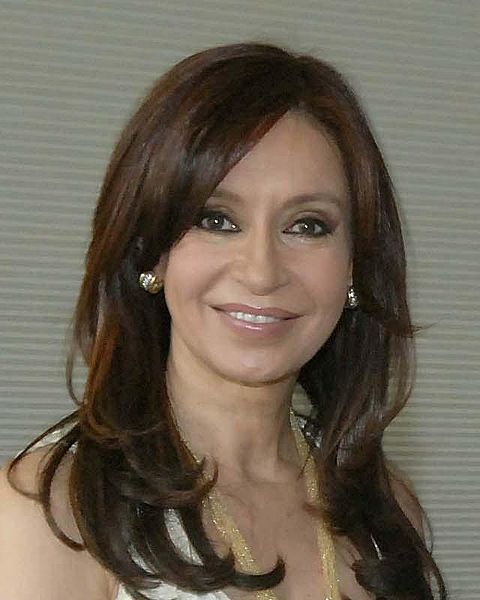Cristina Fernández de Kirchner
Cristina Elisabet Fernández de Kirchner (born February 19, 1953) is an Argentina politician from the Justicialist Party and  the current President of Argentina. She is the wife of former President of Argentina Néstor Kirchner. Before assuming the presidency she was a Senator for Buenos Aires Province and acted as First Lady during her husband’s term. She is the first elected female President of Argentina, and the second female President after Isabel Martinez de Perón, 1974-1976.
the current President of Argentina. She is the wife of former President of Argentina Néstor Kirchner. Before assuming the presidency she was a Senator for Buenos Aires Province and acted as First Lady during her husband’s term. She is the first elected female President of Argentina, and the second female President after Isabel Martinez de Perón, 1974-1976.
Early Life and Education
Cristina Elizabeth Fernández was born in La Plata, province of Buenos Aires. She studied law at the National University of La Plata during the 1970s. During her studies there, she met her future spouse, Néstor. They married on March 9, 1975 and had two children. Both were active in the Peronist Youth movement of the Justicialist Party in the 1970s.
Political Rise
In 1976, the couple went to live in his home region, the southern province of Santa Cruz, where they both started their political careers. She was elected first as a provincial then as a national deputy. In 1991, Mr Kirchner was elected governor of Santa Cruz, a post he won twice more, while Cristina supported him in her capacity as a deputy.
When Mr Kirchner took office as president in 2003, Cristina Fernandez was a senator in Congress, where she actively supported her husband’s policies. Cristina cemented her political position in the congressional elections of 2005. Taking 46% of the votes, she won in the province of Buenos Aires in a contest dubbed “the wives’ duel”, beating her main rival, Hilda Gonzalez, the wife of the former President Eduardo Duhalde (2002-2003).
During Mr Kirchner’s administration, there was almost no decision taken in which she did not have a say, her influence exceeding that of an ordinary lawmaker.
Presidency
During the first days of her presidency, Argentina’s relations with the United States deteriorated as a result of allegations made by a United States assistant attorney of illegal campaign contributions. Kirchner and Venezuelan president Hugo Chavez called the allegations “a trashing operation” and part of a conspiracy orchestrated by the U.S. to divide Latin American nations.
In March 2008, Kirchner’s government introduced a new sliding-scale taxation system for agricultural exports, effectively raising levies on soybean exports to 44% from 35% . This led to a nationwide lockout by farming associations with the aim to force the government to back down on the new taxation scheme. As a result, on March 25, thousands of demonstrators banging pots massed around the obelisk in the capital and in front of the presidential palace. Protests extended across the country.
Kirchner’s inflexible handling of the protests and reluctance to review the policies that sparked the protest have led some people to claim that it is her husband, predecessor in office and current leader of the Justicialist Party who contols her administration. Mrs. Kirchner sent the project of sliding-scale taxation system for agricultural exports to the National Congress to be convalidated as a national law, in an attempt to solve the problem according to the rules of the Argentine Constitution. The project was approved by the Lower Chamber, and sent to the Senate for final approval; however, after a 36-36 tie, Vice President Julio Cobos, who must act as President of the Senate and decide in case of a tie, voted against the project.
As of February 2009, Cristina Kirchner’s approval rating was of 28%, ranking as the third least popular South American Presidents, only above Peruvian president Alan García and Manuel Zelaya of Honduras.
Policies on Women
President Cristina Kirchner is a member of the Council of Women World Leaders , an international network of current and former women presidents and prime ministers whose mission is to mobilize the highest-level women leaders globally for collective action on issues of critical importance to women and equitable development. She is also known as a campaigner for human rights and Women's rights.
She has been compared to Eva Peron, Argentina’s legendary first lady of the late 1940s and early 50s. She has rejected this comparison although in one interview she described herself as an “Evita of the hair in a bun and the clenched fist before a microphone” (the typical image of Eva Perón during public speeches) more than with the “miraculous Eva” of her mother’s time, who had come “to bring work and the right to vote for women”.
References
- Casa Rosada
- BBC News (2013), “Profile: Cristina Fernandez de Kirchner”
- Wikipedia, “Cristina Fernández de Kirchner”


